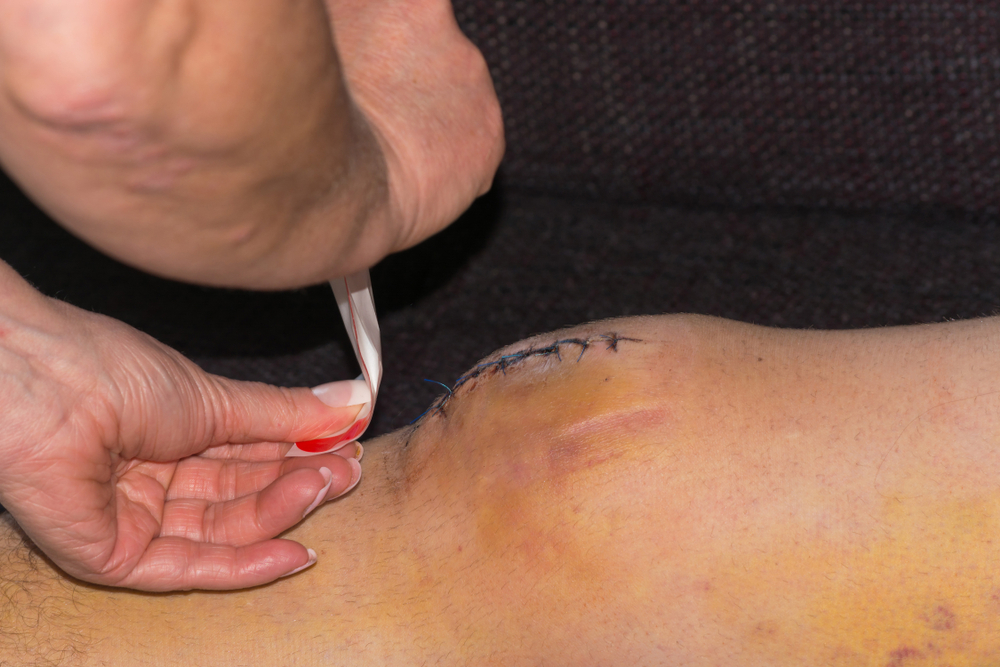Medial unicompartmental knee replacement

Traditionally, total knee replacement was the common surgical treatment for severe osteoarthritis of the knee. In total knee replacement, all damaged or worn surfaces of the knee joint are removed and replaced with new artificial parts. A partial or half knee replacement – also known as a medial unicompartmental knee arthroplasty – is a surgical option if your osteoarthritis is confined to a single compartment of your knee. Indications for medial unicompartmental knee arthroplasty have expanded over the past two decades. Advantages include faster recovery, improved kinematics and better functional outcomes compared with total knee replacement. Orthopaedic surgeon Lorcan McGonagle of LMcG Orthopaedics in Geraldton explains the procedure.
What is knee osteoarthritis?
The knee is divided into three major compartments:
- Medial compartment (the inside part of the knee)
- Lateral compartment (outside part of the knee)
- Patellofemoral compartment (the front of the knee between the kneecap and thighbone)
In knee osteoarthritis, the cartilage protecting the bones of the knee slowly wears away. This can occur throughout the knee joint or in a single area of the knee.
What is medial unicompartmental knee replacement?
Advanced osteoarthritis that is limited to a single compartment may be surgically treated with a unicompartmental knee replacement. During this procedure, the damaged compartment is replaced with metal and plastic. The healthy cartilage and bone, as well as all the ligaments, are preserved.
Am I a candidate for medial unicompartmental knee replacement surgery?
If your osteoarthritis has advanced and nonsurgical treatment options are no longer relieving your symptoms, you may be a candidate for unicompartmental knee replacement surgery. To be considered, your arthritis must be limited to one compartment of your knee. This surgery is an alternative to the whole knee being replaced. It is estimated that 90% of patients have arthritis and thus pain on the inside of the knee. If you don’t have pain on the outside or the front (patella) of your knee and your disease is mild on arthritis classification, you may be suitable for a half a knee replacement.
What are the benefits of unicompartmental knee replacement?
With proper patient selection, modern unicompartmental knee replacements have demonstrated excellent results in patients of all ages. Multiple studies show that most patients who are appropriate candidates for unicompartmental knee replacement have good results with this procedure. Most patients return to work 6-8 weeks after surgery.
Benefits include:
- Small incision – no need to cut the muscle of the thigh to get into the knee
- Bone preserving – only the inside of the knee is opened and the bone ends cut
- All the knee ligaments are preserved
- Less pain after surgery compared with a total knee replacement
- Less blood loss than a total knee replacement
- Low risk of infection and blood clots
- Quicker recovery – three weeks as opposed to six weeks for a total knee replacement
Also, because the bone, cartilage and ligaments in the healthy parts of the knee are preserved, many patients report that a unicompartmental knee replacement feels more natural than a total knee replacement. A unicompartmental knee may also bend better.
Are there any exercises that can prevent knee osteoarthritis?
A range of exercise types have been found to be moderately effective for adults with knee osteoarthritis. These can be performed at home, in a group setting or at a local gym. Evidence suggests that a combination of strength, aerobic and flexibility exercise is most likely to improve pain and physical function outcomes in adults with knee osteoarthritis. There is limited evidence about the frequency, duration and intensity required for effective management of the condition. Physiotherapists or exercise physiologists can provide advice about a training program. Patients may be eligible for a Medicare rebate under the Enhanced Primary Care (EPC) Program.
Does Dr Lorcan McGonagle treat workers’ compensation cases?
Workers Compensation cases are welcome at LMcG Orthopaedics. The patient must provide a claim number or written acceptance of claim so the insurance company can be billed directly. If a claim has not been submitted or the claim is pending, the patient must make payment upfront on the day of consultation and claim back through the insurance company at a later date once the claim is approved.
Medial unicompartmental knee replacement surgery: LMcG Orthopaedics
Osteoarthritis of the knee can cause considerable pain and affect your way of life. At LMcG Orthopaedics, Doctor Lorcan McGonagle provides a range of orthopaedic surgeries and treatments. Dr McGonagle’s specialties include knees, shoulder, elbow, wrist and hand, hip, foot and ankle.
If you have a question for Dr McGonagle and his Geraldton team, please get in touch with the clinic today on 08 9921 4847. LMcG Orthopaedics is in Suite 6, St John of God Specialist Centre, 12 Hermitage Street, Geraldton.
References
Unicompartmental knee replacement | healthdirect
RACGP – Exercise for knee osteoarthritis
Factors influencing return to work after hip and knee arthroplasty – PubMed (nih.gov)
Medial Unicompartmental Arthroplasty of the Knee – PubMed (nih.gov)
